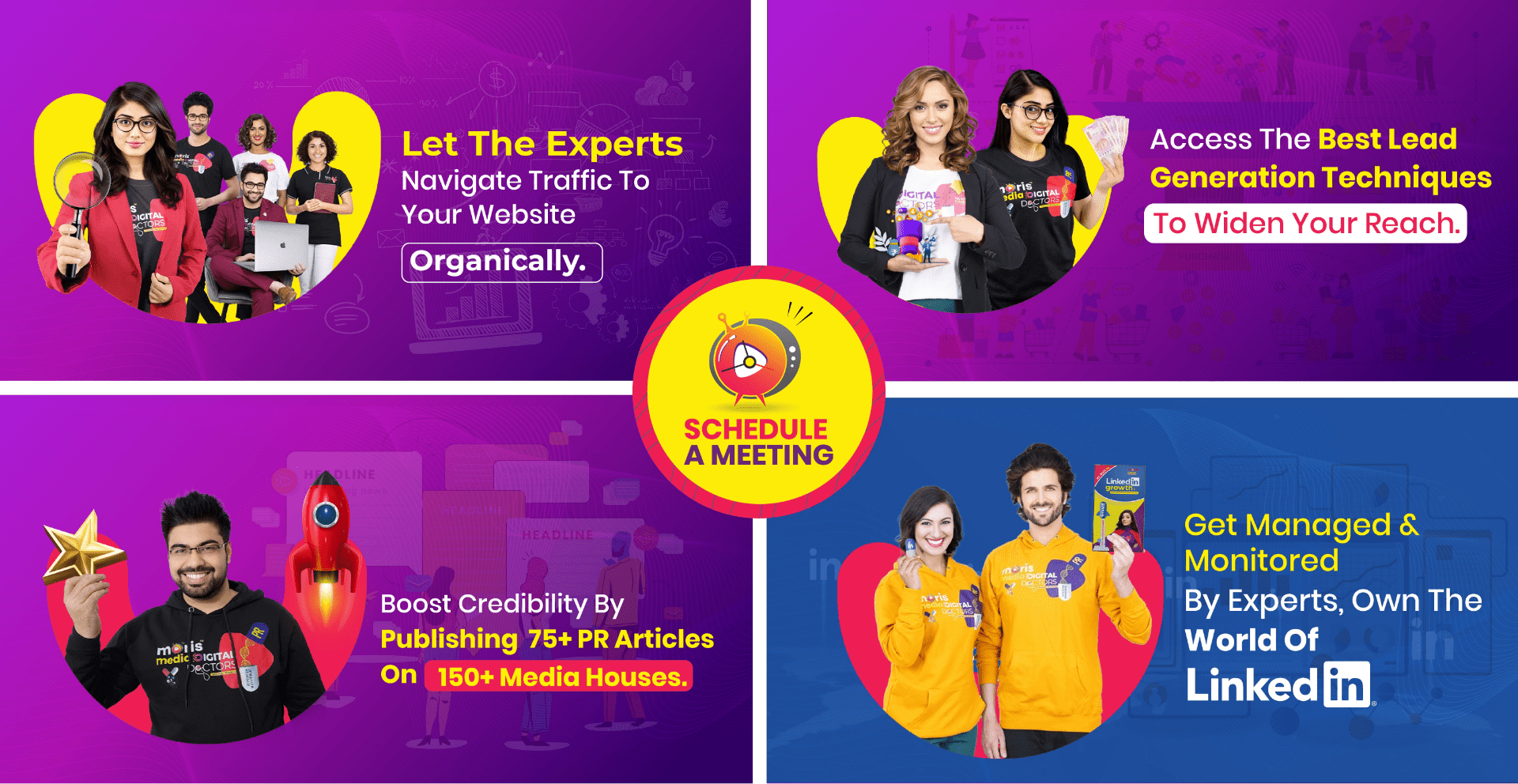Frequently Asked Questions
Lead scoring is a method used by businesses to evaluate and rank leads based on their potential to become customers. It assigns numerical values or scores to leads based on predefined criteria that indicate their level of interest, engagement, and fit with your ideal customer profile. Lead scoring helps in prioritizing leads by focusing efforts and resources on leads that are most likely to convert.
Moris Media shows you how lead scoring works and how it can help in prioritizing leads:
Criteria and Scoring Factors: Determine the criteria and scoring factors that align with your target customer characteristics and buying behavior. These factors can include demographic information (e.g., job title, industry, company size), lead source, engagement level (e.g., website visits, email opens, content downloads), and explicit actions (e.g., requesting a demo, pricing inquiry).
Assigning Scores: Assign scores to each criterion or action based on their relative importance and likelihood to indicate purchase intent or readiness. For example, a lead who visits the pricing page and requests a demo might receive higher scores compared to a lead who only visited the blog.
Score Threshold: Define a score threshold that determines which leads are considered "sales-ready" or "marketing-qualified." This threshold is based on your understanding of the typical behavior of leads who convert into customers.
Lead Segmentation: Segment leads into different categories based on their scores. This allows you to prioritize leads and tailor your marketing and sales efforts accordingly. For example, high-scoring leads can be passed directly to the sales team for immediate follow-up, while lower-scoring leads may require further nurturing.
Sales and Marketing Alignment: Establish clear communication and alignment between your sales and marketing teams. Define the lead handoff process and the criteria for passing leads from marketing to sales based on their scores. This ensures that both teams are aligned in their efforts and prioritize their actions based on lead scores.
Nurturing and Personalization: Use lead scores to personalize your lead nurturing efforts. Tailor your messaging, content, and offers based on the lead's score to provide relevant information and drive engagement. High-scoring leads may receive more personalized and sales-focused communications, while lower-scoring leads can receive educational content to further nurture their interest.
Continuous Evaluation and Optimization: Regularly review and refine your lead scoring criteria based on the feedback from your sales team and the analysis of lead conversion data. Adjusting the scoring factors and thresholds based on real-world performance helps ensure that your lead scoring model remains accurate and effective.
A lead management system is a software tool or platform designed to help businesses capture, track, and manage their leads throughout the sales process. It provides a centralized database for storing lead information, facilitates lead nurturing and follow-up, and enables effective collaboration between sales and marketing teams.
Moris Media highlights some key features and benefits of a lead management system:
Lead Capture and Organization: A lead management system allows you to capture leads from various sources such as website forms, landing pages, social media, and events. It organizes and stores lead information in a structured manner, making it easy to access and manage.
Lead Tracking and Follow-up: With a lead management system, you can track lead activities, interactions, and engagement across different touchpoints. It helps you prioritize follow-up actions, set reminders for sales calls or emails, and ensure timely and consistent communication with leads.
Lead Nurturing and Automation: A lead management system enables automated lead nurturing through personalized email campaigns, triggered messages, and targeted content delivery. It helps build relationships with leads, educate them about your offerings, and guide them through the buyer's journey.
Lead Scoring and Prioritization: Many lead management systems include lead scoring capabilities, allowing you to assign scores to leads based on their behavior, demographics, and engagement level. This helps prioritize leads for sales follow-up and ensures that resources are allocated to the most promising opportunities.
Collaboration and Communication: A lead management system facilitates seamless collaboration between sales and marketing teams. It enables sharing of lead information, tracking of lead status and activities, and communication within the system, improving overall efficiency and alignment.
Reporting and Analytics: Lead management systems provide reporting and analytics features that allow you to track and measure the effectiveness of your lead generation and sales efforts. You can monitor key metrics, evaluate conversion rates, and gain insights to optimize your lead management strategies.
Whether you need a lead management system for your business depends on various factors such as the size of your business, the volume of leads you generate, and the complexity of your sales process. If you have a high number of leads, multiple team members involved in lead management, and a need for streamlined and automated lead nurturing, a lead management system can greatly benefit your business.
Implementing a lead management system can enhance your lead generation and sales processes, improve lead conversion rates, and provide better visibility and control over your leads. It helps you stay organized, responsive, and focused on driving revenue through effective lead management.
Generating leads through webinars and online events can be an effective strategy to engage with your target audience, showcase your expertise, and capture valuable leads. Moris Media highlights some key steps to generate leads through webinars and online events:
Choose a Relevant Topic: Select a webinar or online event topic that aligns with your target audience's interests and pain points. The topic should be informative, valuable, and relevant to your products or services.
Promote Your Event: Create a landing page or registration form specifically for your webinar or online event. Use various marketing channels such as your website, blog, email marketing, social media, and paid advertising to promote the event and encourage registrations.
Engaging Content and Presentation: Develop compelling content for your webinar or online event that delivers value to your audience. Use visual aids, slides, videos, and interactive elements to make the presentation engaging and informative. Consider inviting guest speakers or industry experts to increase credibility and attract more attendees.
Registration and Lead Capture: Require attendees to register for the webinar or online event by providing their contact information. This allows you to capture leads and build your database. Keep the registration process simple and ask for essential details like name, email address, and company.
Pre-event Communication: Send confirmation emails to registered attendees with event details, instructions to join, and reminders leading up to the event. This helps keep participants engaged and ensures they don't miss the webinar or online event.
Live Interaction and Q&A: Encourage active participation during the webinar or online event by allowing attendees to ask questions, provide feedback, or engage in discussions. Conduct live polls or surveys to gather insights and make the session interactive.
Post-event Follow-up: After the webinar or online event, follow up with attendees via email. Share a recording of the session, additional resources, or exclusive offers to further engage and nurture the leads. Consider setting up automated email sequences to deliver content and continue the conversation.
Lead Scoring and Segmentation: Assign lead scores based on attendee engagement, participation, and interactions during the webinar or online event. Segment leads based on their interests and behavior to personalize future communications and follow-up.
Repurpose Content: Repurpose the webinar or online event content into blog posts, infographics, videos, or downloadable resources. This allows you to extend the reach of your content and capture additional leads through different channels.
Analyse Results and Refine: Measure the success of your webinar or online event by tracking metrics such as registrations, attendance rate, engagement, and lead conversions. Analyse the data to identify areas for improvement and refine your strategies for future events.
When it comes to lead generation on social media platforms, Moris Media advises that you follow some best practices you can follow to maximize your results.
Identify the Right Social Media Platforms: Focus on the social media platforms where your target audience is most active. Conduct research and analyse demographics, user behavior, and engagement levels to determine the platforms that align with your business goals.
Optimize Your Social Media Profiles: Ensure that your social media profiles are complete, professional, and optimized for lead generation. Use compelling visuals, clear and concise descriptions, and include a link to your website or landing page where leads can take action.
Create Engaging Content: Develop content that resonates with your target audience and encourages engagement. Use a mix of informative, educational, entertaining, and promotional content to keep your audience interested. Incorporate visuals, videos, infographics, and interactive elements to enhance engagement.
Implement Lead Generation Forms: Many social media platforms offer lead generation forms that allow users to provide their contact information directly on the platform. Use these forms strategically in your campaigns to capture leads without redirecting users to external landing pages.
Run Targeted Ad Campaigns: Utilize targeted advertising on social media platforms to reach your ideal audience. Segment your audience based on demographics, interests, and behaviours, and create ad campaigns that specifically target these segments. Use compelling visuals, clear messaging, and strong call-to-action buttons to drive leads to your desired action.
Leverage Lead Generation Ads: Some social media platforms offer lead generation ad formats that are specifically designed to capture leads. These ads feature built-in forms that allow users to submit their contact information within the ad itself, making it convenient for users to convert.
Engage with Your Audience: Actively engage with your audience by responding to comments, messages, and mentions. Build relationships, answer inquiries, and provide valuable information. This fosters trust and credibility, making it more likely for your audience to convert into leads.
Utilize Influencer Marketing: Collaborate with influencers or industry experts who have a significant following and influence on social media. Partnering with them can help increase your brand visibility, reach a wider audience, and generate leads through their endorsements and recommendations.
Offer Valuable Incentives: Provide incentives to encourage social media users to become leads. This can include offering exclusive content, discounts, giveaways, or access to gated resources in exchange for their contact information.
Track, Analyse, and Optimize: Regularly monitor your social media metrics and analyse the performance of your lead generation efforts. Track key metrics such as click-through rates, conversions, engagement, and cost per lead. Use the insights gained to refine your strategies, optimize your campaigns, and improve your lead generation results over time.
Leveraging influencer marketing can be a powerful strategy to generate leads. Moris Media suggests some steps to effectively use influencer marketing for lead generation:
Identify Relevant Influencers: Look for influencers who have an audience that aligns with your target market. Consider factors such as their niche, audience demographics, engagement levels, and credibility. Choose influencers who have a genuine connection with their followers and can effectively promote your product or service.
Define Your Campaign Objectives: Determine the specific goals you want to achieve with your influencer marketing campaign. Is it to drive traffic to your website, increase sign-ups for a webinar, or encourage direct sales? Clearly define your objectives so that you can align your campaign strategy accordingly.
Develop a Partnership Approach: Approach influencers with a personalized and collaborative mindset. Craft a compelling proposal that outlines the mutual benefits of working together. Highlight how their audience can benefit from your offering and emphasize the value you can provide to their followers.
Collaborate on Content Creation: Work closely with influencers to develop content that resonates with their audience and promotes your lead generation goals. This can include sponsored blog posts, social media posts, videos, live streams, or product reviews. Ensure that the content includes clear calls-to-action and encourages their followers to take the desired action, such as signing up or visiting your landing page.
Incorporate Trackable Links and Promo Codes: Provide influencers with unique trackable links or promo codes to include in their content. This allows you to attribute leads generated directly to their efforts. Use UTM parameters or specific landing pages to track the traffic and conversions driven by each influencer.
Run Contests or Giveaways: Collaborate with influencers to organize contests or giveaways that encourage their followers to participate and provide their contact information. Make it a requirement for participants to provide their email address or fill out a lead capture form to enter the contest. This allows you to capture leads while creating excitement around your brand and incentivizing participation.
Monitor and Measure Results: Track the performance of your influencer campaigns to assess their impact on lead generation. Monitor metrics such as website traffic, click-through rates, conversion rates, and the number of leads generated. Use tracking tools, analytics, and CRM systems to measure the success of each influencer collaboration and identify opportunities for improvement.
Nurture and Convert Leads: Once you capture leads through influencer marketing, implement a lead nurturing strategy to move them through your sales funnel. Provide valuable content, personalized follow-ups, and incentives to encourage conversions. Continually engage with the leads and provide them with the information and support they need to make a purchasing decision.
By leveraging influencer marketing effectively, you can tap into the influencer's audience, build trust, and generate high-quality leads. Remember to choose influencers whose values align with your brand, collaborate on engaging content, and track the results to optimize your campaigns for lead generation success.
Customer feedback plays a crucial role in lead generation. Here's how:
Enhances Trust and Credibility: Positive customer feedback and testimonials provide social proof and build trust among potential leads. When prospects see that others have had a positive experience with your product or service, they are more likely to trust your brand and consider becoming a lead themselves.
Influences Purchase Decisions: Customer feedback influences the decision-making process of potential leads. Reviews, ratings, and testimonials help prospects understand the value and benefits of your offering, which can sway their decision to convert into a lead. Positive feedback validates their interest and encourages them to take the next step.
Refines Targeting and Messaging: Customer feedback provides insights into the needs, preferences, and pain points of your target audience. By analysing feedback, you can identify common themes and tailor your lead generation strategies accordingly. This helps you create targeted messaging that resonates with potential leads, increasing the likelihood of capturing their interest.
Identifies Advocates and Referral Opportunities: Satisfied customers who provide positive feedback can become brand advocates and refer new leads to your business. Their testimonials and word-of-mouth recommendations can attract more potential leads, expanding your reach and generating new business opportunities.
Improves Product or Service Offerings: Customer feedback highlights areas for improvement in your product or service. By actively listening to feedback, you can identify and address pain points, enhance features, and provide a better customer experience. Continuous improvement based on customer feedback not only increases customer satisfaction but also makes your offering more appealing to potential leads.
Guides Lead Generation Strategies: Customer feedback provides valuable insights for refining your lead generation strategies. By understanding what aspects of your marketing efforts resonated with your customers, you can optimize your campaigns to attract similar leads. Feedback helps you understand which channels, messages, or offers were most effective in converting customers, allowing you to replicate those strategies for lead generation.
Builds Long-Term Relationships: By actively seeking and responding to customer feedback, you demonstrate that you value their opinions and are committed to their satisfaction. This builds stronger relationships with your customers, increasing the likelihood of repeat business and referrals. Happy customers are more likely to become repeat customers and advocate for your brand, driving additional leads through their positive experiences.
Moris Media suggests that to leverage customer feedback for lead generation, encourage your customers to provide reviews and testimonials through various channels, such as surveys, online review platforms, social media, or email campaigns. Actively monitor and respond to feedback, address any concerns promptly, and use positive feedback as a promotional tool to attract potential leads. Incorporate customer feedback into your lead generation strategies to enhance trust, refine targeting, and continuously improve your offerings.
Celebrity management refers to the professional practice of representing, guiding, and overseeing the careers and public image of celebrities. It involves handling various aspects of a celebrity's career, including contract negotiations, brand endorsements, publicity, media relations, event appearances, and overall career development. Celebrity managers at Moris Media, India’s best Celebrity Management agency, work closely with their clients to navigate the entertainment industry, make strategic decisions, and maximize opportunities for success while ensuring the protection of their clients' interests and reputation. The role of a celebrity manager often involves a wide range of responsibilities aimed at enhancing the celebrity's career trajectory and overall brand image
A celebrity manager performs a variety of tasks to support and advance the career of a celebrity. Moris Media highlights some of the key responsibilities of our celebrity managers:
Talent Representation: A celebrity manager serves as the primary point of contact and representative for the celebrity in all professional matters.
Career Planning: They devise long-term strategies to help shape and guide the celebrity's career, identifying opportunities for growth and success.
Contract Negotiation: Celebrity managers handle contract negotiations for various projects, including films, TV shows, music albums, endorsements, and appearances.
Brand Endorsements: They seek out and manage brand endorsement deals, ensuring alignment with the celebrity's image and values.
Publicity and Media Relations: Celebrity managers coordinate media appearances, interviews, and press releases to generate positive publicity and maintain a favourable public image.
Personal Branding: They work on building and managing the celebrity's personal brand, creating a distinct identity that aligns with their talents, values, and target audience.
Financial Management: Celebrity managers oversee financial matters, including budgeting, accounting, and financial planning, ensuring the celebrity's financial well-being.
Image and Reputation Management: They handle crisis management, damage control, and reputation enhancement to safeguard the celebrity's public image and mitigate negative situations.
Talent Development: Celebrity managers identify opportunities for talent development, such as acting workshops, vocal training, and other skill enhancement programs.
Event Management: They coordinate appearances, performances, and public engagements, managing logistics, scheduling, and travel arrangements.
Networking: Celebrity managers build and maintain relationships with industry professionals, including agents, publicists, directors, producers, and brand representatives, to create opportunities for their clients.
Social Media Management: They oversee the celebrity's social media presence, engaging with fans, managing content, and strategizing to enhance the online brand.
Team Coordination: Celebrity managers collaborate with a team of professionals, including agents, publicists, lawyers, stylists, and assistants, to ensure smooth operations and cohesive representation.
Long-term Planning: They assist in making strategic career decisions, such as selecting roles or projects, exploring new markets, and diversifying the celebrity's portfolio.
Personal Support: Celebrity managers often provide emotional support, guidance, and mentorship to their clients, acting as a trusted advisor and confidant.
Becoming a celebrity manager typically requires a combination of education, skills, experience, and networking. Moris Media suggests some steps you can take to pursue a career in celebrity management:
Gain Relevant Education: While there is no specific educational path for celebrity management, obtaining a degree in fields such as business management, communications, marketing, or entertainment management can provide a solid foundation. Consider pursuing courses or certifications that focus on talent management, contract negotiation, public relations, and marketing.
Develop Interpersonal and Communication Skills: Celebrity management involves working closely with high-profile individuals and handling various stakeholders. Strong interpersonal skills, effective communication, and the ability to build and maintain relationships are crucial.
Gain Industry Experience: Start by gaining experience in the entertainment industry or related fields. Consider internships or entry-level positions at talent agencies, event management companies, PR firms, or entertainment production companies. This will provide you with valuable industry insights and connections.
Networking: Build a network of contacts within the entertainment industry. Attend industry events, seminars, and conferences. Connect with professionals such as agents, publicists, talent scouts, and other industry insiders. Networking can open doors to potential clients and career opportunities.
Specialize and Hone Skills: Determine your area of specialization within celebrity management. It could be talent scouting, contract negotiation, brand endorsements, or image management. Hone your skills in that particular area to differentiate yourself and enhance your expertise.
Assist Established Celebrity Managers: Consider working as an assistant or junior manager for an established celebrity manager. This provides valuable hands-on experience, mentorship, and exposure to the workings of the industry.
Build a Professional Reputation: Develop a reputation for professionalism, reliability, and discretion. Your ability to maintain confidentiality and handle sensitive information is crucial in the field of celebrity management.
Develop a Portfolio: As you gain experience, build a portfolio showcasing your successful projects, endorsements, and clients. Highlight your achievements and demonstrate your ability to manage and elevate a celebrity's career.
Stay Updated: Keep up with industry trends, emerging artists, and changes in the entertainment landscape. Stay informed about the latest technology, social media platforms, and marketing strategies that can impact celebrity management.
Obtain Necessary Licenses or Certifications: Depending on your location and the services you offer, there may be specific licenses or certifications required for operating as a celebrity manager. Research and comply with any legal or regulatory requirements.
To excel in celebrity management, you need a combination of skills and attributes. Here are some essential skills needed for success in the field:
Communication Skills: Strong verbal and written communication skills are vital for effective interaction with clients, industry professionals, media, and other stakeholders. Clear and persuasive communication helps convey the celebrity's message, negotiate contracts, and manage relationships.
Interpersonal Skills: Building and maintaining relationships is at the core of celebrity management. Excellent interpersonal skills allow you to connect with clients, understand their needs, collaborate with team members, and navigate complex situations. Empathy, diplomacy, and the ability to handle diverse personalities are crucial.
Networking: Developing a broad network of contacts within the entertainment industry is essential. Strong networking skills help you connect with agents, publicists, casting directors, producers, and brand representatives. This enables you to create opportunities, negotiate deals, and stay informed about industry trends.
Business and Financial Acumen: Celebrity management involves making strategic business decisions, negotiating contracts, and managing finances. Understanding contract terms, budgeting, forecasting, and financial planning are essential skills for effective management of a celebrity's career.
Problem-Solving and Decision-Making: Celebrity management often involves navigating complex and challenging situations. Strong problem-solving skills help you find creative solutions, make quick decisions, and handle unexpected circumstances effectively.
Negotiation Skills: Negotiating contracts, endorsement deals, appearances, and other agreements is a critical aspect of celebrity management. Strong negotiation skills, including the ability to analyse contracts, advocate for your client's interests, and find win-win solutions, are crucial.
Organization and Time Management: Celebrity managers handle numerous tasks simultaneously, including scheduling, travel arrangements, meetings, and contractual obligations. Excellent organizational and time management skills are essential to ensure all responsibilities are fulfilled efficiently.
Attention to Detail: Paying close attention to detail is crucial in celebrity management, as even minor mistakes can have significant consequences. Whether it's contract terms, media releases, or scheduling, meticulousness and accuracy are vital to avoid errors.
Adaptability and Flexibility: The entertainment industry is dynamic and constantly evolving. Celebrity managers need to be adaptable and flexible, adjusting strategies and plans as per changing circumstances, industry trends, and client needs.
Confidentiality and Discretion: Trust is paramount in celebrity management. Maintaining strict confidentiality and exercising discretion regarding personal and professional matters is essential for building and maintaining trust with clients.
Knowledge of Entertainment Industry: Staying knowledgeable about the entertainment industry, including trends, popular culture, emerging talent, and industry dynamics, is essential. This allows you to identify opportunities, make informed decisions, and provide valuable guidance to your clients.
Emotional Intelligence: Emotional intelligence helps you understand and manage emotions, both in yourself and in others. This skill enables you to navigate sensitive situations, provide support to clients, and build strong professional relationships.
Moris Media urges you to remember that while these skills are crucial, they can be further developed and honed through experience, continuous learning, and professional growth. Celebrity management requires a unique blend of business acumen, interpersonal skills, industry knowledge, and the ability to adapt to the ever-changing dynamics of the entertainment world.
The key responsibilities of a celebrity manager can vary depending on the specific needs of the client and the scope of the manager's role. However, here are some common responsibilities:
Career Strategy and Planning: Developing long-term career strategies and goals for the celebrity, including selecting projects, exploring new opportunities, and managing career transitions.
Contract Negotiation: Negotiating contracts for various projects such as films, TV shows, music albums, brand endorsements, appearances, and other professional engagements. Ensuring favourable terms and protecting the interests of the celebrity.
Brand Development and Management: Building and managing the celebrity's brand identity, including personal branding, image management, and reputation enhancement.
Publicity and Media Relations: Coordinating media appearances, interviews, press releases, and managing relationships with journalists and media outlets to generate positive publicity and enhance the celebrity's public image.
Talent Booking and Appearances: Handling bookings for public appearances, events, performances, and speaking engagements, including managing logistics, scheduling, and contractual obligations.
Financial Management: Overseeing the financial aspects of the celebrity's career, including budgeting, accounting, financial planning, and ensuring financial stability and growth.
Endorsements and Sponsorships: Seeking out and managing brand endorsement deals and sponsorship opportunities that align with the celebrity's image, values, and target audience.
Team Coordination: Collaborating with a team of professionals, including agents, publicists, lawyers, stylists, and assistants, to ensure cohesive representation and successful execution of projects.
Crisis Management: Handling crisis situations, managing controversies, and implementing damage control strategies to protect the celebrity's reputation and minimize negative impact.
Networking and Industry Relationships: Building and maintaining relationships with industry professionals, including agents, directors, producers, casting agents, brand representatives, and other key stakeholders to create opportunities and expand the celebrity's network.
Social Media Management: Overseeing the celebrity's social media presence, including content strategy, engagement with fans, monitoring online reputation, and leveraging social media platforms for brand building.
Personal Support and Guidance: Providing emotional support, mentorship, and guidance to the celebrity, serving as a trusted advisor and confidant in both personal and professional matters.
Market Research and Trend Analysis: Staying informed about industry trends, market demands, and audience preferences to identify potential opportunities and make informed career decisions.
International Collaborations and Projects: Managing international projects, collaborations, and tours, including navigating cultural differences, logistics, and contractual requirements.
Continuous Professional Development: Staying updated on industry developments, emerging trends, new technologies, and best practices through ongoing learning, attending conferences, workshops, and industry events.
As a leading celebrity management agency, Moris Media feels it’s important to note that the responsibilities may evolve and adapt based on the specific needs of the celebrity and the dynamic nature of the entertainment industry. A celebrity manager's role is multifaceted, encompassing various aspects of career management, business strategy, branding, and relationship building.
Finding clients as a celebrity manager requires a combination of proactive networking, reputation building, and strategic marketing. Moris Media suggests some methods that celebrity managers use to find clients:
Networking: Building a strong network of industry contacts is crucial for finding clients. Attend industry events, conferences, and parties to meet industry professionals, including agents, publicists, producers, directors, and artists. Networking allows you to establish relationships and gain referrals for potential clients.
Referrals: Word-of-mouth recommendations play a significant role in finding clients. Satisfied clients or industry professionals who have worked with you may refer you to other celebrities seeking management. Provide excellent service and cultivate positive relationships to encourage referrals.
Industry Associations: Join professional associations and organizations related to the entertainment industry. These associations often have directories, events, and resources that can connect you with potential clients. Engage actively, attend meetings, and leverage the association's network.
Online Presence: Maintain a strong online presence through a professional website, social media platforms, and online directories. Showcase your expertise, successes, and client testimonials to attract potential clients who may search for talent managers online.
Talent Agencies: Collaborate with talent agencies and talent scouts who are responsible for discovering and nurturing talent. Build relationships with these professionals, as they can refer emerging artists or individuals seeking management.
Industry Internships: Offer internships or assistant positions within your agency or management company. This allows you to identify emerging talent and potentially nurture them as clients in the future.
Personal Branding: Establish a strong personal brand as a celebrity manager. Define your unique value proposition, highlight your experience and successes, and showcase your expertise in the field. A strong personal brand can attract potential clients who resonate with your approach and vision.
Showcase Events and Showcases: Attend industry showcase events, talent competitions, and festivals where emerging artists or individuals seeking management often participate. This provides opportunities to identify talent and engage with potential clients.
Industry Publications and Media: Contribute articles, insights, or interviews to industry publications or media outlets. This positions you as an expert in the field and increases your visibility, making you more attractive to potential clients.
Personal Connections and Recommendations: Leverage your personal connections, friends, family, and colleagues in the entertainment industry. Inform them about your services and ask them to recommend you to individuals they know who are seeking management.
Direct Outreach: Identify potential clients who align with your expertise and interests. Conduct targeted research to learn about their projects, career goals, and needs. Reach out to them directly through personalized emails, letters, or through mutual contacts to express your interest in representing them.
Handling contract negotiations is a crucial aspect of a celebrity manager's role. Here are some key steps and strategies that celebrity managers employ during contract negotiations:
Preparation: Thoroughly research the project or opportunity in question. Understand the scope of work, financial terms, duration, and any special considerations. Familiarize yourself with industry standards, market rates, and comparable deals to establish a baseline for negotiation.
Identify Goals and Priorities: Collaborate with the celebrity to identify their goals, priorities, and non-negotiables for the contract. Determine what aspects are most important to them, such as compensation, creative control, rights, or additional perks. This information will guide your negotiation strategy.
Establish Leverage: Assess the celebrity's market value, current popularity, track record, and demand in the industry. Use this information to gauge your leverage in the negotiation and negotiate favourable terms.
Understand Contract Terms: Review the contract thoroughly, ensuring you understand all the terms and clauses. Seek legal advice if necessary to ensure you are aware of any potential pitfalls or ambiguities in the agreement.
Negotiation Strategy: Develop a negotiation strategy based on your client's goals and the market value of their talent. Determine which terms are most negotiable and which ones are deal-breakers. Plan your approach for each negotiation point to maximize the celebrity's interests.
Communication and Relationship Building: Establish a positive and respectful relationship with the other party involved in the negotiation, such as producers, directors, or brand representatives. Effective communication, active listening, and building rapport can foster a more cooperative and successful negotiation process.
Articulate Value Proposition: Clearly articulate the value that your client brings to the project. Highlight their unique skills, track record, audience appeal, and the potential benefits they can provide to the project or brand. Demonstrating this value can strengthen your position during negotiations.
Creative Solutions: Explore alternative options or creative solutions that can satisfy both parties' interests. Sometimes, it's possible to find compromises or additional incentives that can bridge gaps and lead to a mutually beneficial agreement.
Contract Flexibility: Ensure that the contract allows for flexibility and protection for your client. Consider including provisions for creative input, renegotiation clauses, performance bonuses, or exit strategies in case the project does not meet expectations.
Legal Support: Consult with entertainment lawyers who specialize in contract negotiation and industry-specific terms. They can provide valuable insights, review the contract, and ensure your client's legal rights and interests are protected.
Document Everything: Maintain thorough documentation of all negotiations, counteroffers, and changes made during the negotiation process. This ensures clarity and accountability for all parties involved.
Final Review: Carefully review the final contract draft before signing. Double-check all agreed-upon terms, financial details, intellectual property rights, and any other critical provisions to ensure accuracy and completeness.
Moris Media, India’s leading celebrity management agency, states that successful contract negotiations require a balance between assertiveness, strategic thinking, and maintaining positive working relationships. Celebrity managers must advocate for their clients' interests while fostering a collaborative environment that leads to mutually beneficial agreements.
The average salary of a celebrity manager in India can vary depending on factors such as the manager's experience, the profile and popularity of their clients, their reputation in the industry, and the scope of services provided. It's important to note that salary structures and compensation in India can differ from other countries. Moris Media, India’s leading celebrity management agency, offers competitive packages to celebrity managers that are highly performance oriented.
In general, the average salary of a celebrity manager in India can range from ₹5 lakhs to ₹20 lakhs or more per year. However, it's essential to consider that these figures are approximate and can vary significantly based on the factors mentioned earlier.
Additionally, the compensation structure for celebrity managers in India can include a combination of fixed salaries, commissions based on the earnings of the clients, and bonuses tied to successful projects or endorsements. The specific terms of the employment agreement and the success of the manager's clients can also impact their overall income.
It's worth noting that managing top-tier celebrities or established artists in India can result in higher salaries or commissions due to the potential for higher earnings. On the other hand, managers representing emerging or less established talent may have lower salary ranges.
As with any industry, individual negotiations, market demand, and the reputation and track record of the celebrity manager will influence their earning potential.
Networking with industry professionals is crucial for a celebrity manager to build connections, gain opportunities, and expand their client base. Moris Media provides some strategies to effectively network with industry professionals as a celebrity manager:
Attend Industry Events: Attend conferences, seminars, workshops, film festivals, award shows, and other industry events. These events offer opportunities to meet and connect with industry professionals, including agents, producers, directors, publicists, and artists. Be active, engage in conversations, and exchange contact information.
Join Professional Associations: Become a member of professional associations and organizations related to the entertainment industry. These associations often host networking events, provide access to industry directories, and offer educational resources. Engage actively, attend meetings, and participate in networking activities.
Utilize Social Media: Leverage social media platforms like LinkedIn, Twitter, and Instagram to connect with industry professionals. Follow influential individuals, join relevant groups, and engage in discussions. Share your insights, projects, and updates to establish your presence and attract potential contacts.
Attend Workshops and Masterclasses: Participate in workshops, masterclasses, and training programs led by industry professionals. These sessions provide opportunities to network with experts and build relationships with fellow participants.
Volunteer or Intern: Offer your services as a volunteer or intern with production companies, talent agencies, event management firms, or industry-related organizations. This hands-on experience allows you to network with professionals, gain industry insights, and potentially connect with potential clients.
Seek Mentorship: Look for experienced celebrity managers who are willing to mentor and guide you. Their guidance and connections can be invaluable in building your network and opening doors to opportunities.
Collaborate on Projects: Seek opportunities to collaborate with other industry professionals on projects. Whether it's a short film, music video, or a promotional event, collaborative projects allow you to work closely with other professionals and build relationships that can lead to future collaborations.
Offer Value: Be proactive in offering value to industry professionals. Provide assistance, share relevant industry news or resources, and contribute your expertise when appropriate. This establishes you as a valuable and reliable contact, fostering goodwill and potentially leading to referrals or collaboration opportunities.
Attend Film Screenings and Premieres: Attend film screenings, premieres, and other industry-related events. These gatherings provide opportunities to meet directors, actors, producers, and other industry insiders. Engage in conversations and follow up with meaningful connections.
Leverage Existing Contacts: Tap into your existing network and ask for introductions to industry professionals. Let friends, family, colleagues, and acquaintances know about your career as a celebrity manager and ask if they can connect you with individuals in the industry.
Follow Up and Maintain Relationships: After making initial connections, be diligent in following up. Send personalized emails or messages to express your gratitude and continue building relationships. Maintain regular contact, provide updates, and offer support when needed.
Remember, networking is a long-term endeavour that requires genuine relationship-building and consistent effort. Be professional, authentic, and respectful in your interactions, and focus on establishing mutually beneficial connections that can lead to future collaborations and opportunities.
Celebrity managers face a variety of challenges in their roles. Here are some common challenges faced by celebrity managers:
Intense Competition: The entertainment industry is highly competitive, and there are numerous celebrity managers vying for top clients. Standing out and securing high-profile clients can be challenging.
Uncertainty and Instability: The entertainment industry is known for its volatility and unpredictable nature. Projects can get delayed or cancelled, clients' popularity can fluctuate, and market trends can shift quickly, leading to uncertainty and instability in a celebrity manager's career.
Balancing Personal and Professional Boundaries: Celebrity managers often develop close relationships with their clients, blurring the lines between personal and professional boundaries. Managing these boundaries while maintaining professionalism can be challenging.
High Expectations and Pressure: Celebrity managers are responsible for shaping their clients' careers, making crucial decisions, and ensuring their success. The pressure to deliver results and meet high expectations can be demanding and stressful.
Crisis Management: Dealing with crises and negative situations, such as scandals, controversies, or public relations issues, is a significant challenge for celebrity managers. Navigating these situations while protecting the client's image and reputation requires skilful crisis management.
Work-Life Balance: Celebrity management often involves long and irregular hours, including attending events, meetings, and managing client emergencies. Maintaining a healthy work-life balance can be challenging, leading to potential burnout.
Privacy and Security Concerns: Celebrity managers must navigate privacy concerns and ensure the safety and security of their clients. Managing paparazzi, intrusive fans, and maintaining confidentiality can be challenging in a world of heightened public scrutiny.
Managing Multiple Clients: Celebrity managers often juggle multiple clients simultaneously, each with their unique needs, projects, and schedules. Balancing the demands and priorities of multiple clients can be challenging and require excellent organizational and time management skills.
Negotiating Contracts and Deals: Securing favourable contracts and deals for clients involves navigating complex negotiations with various stakeholders. The ability to negotiate effectively and protect the client's interests can be challenging, particularly when dealing with powerful industry players.
Keeping Up with Industry Trends: The entertainment industry is constantly evolving with new platforms, technology, and trends. Staying updated and adapting to these changes is crucial for celebrity managers to remain relevant and provide effective guidance to their clients.
Managing Expectations: Balancing the ambitions and aspirations of clients with realistic career opportunities can be challenging. Celebrity managers must help clients set achievable goals while managing their expectations and ensuring a sustainable career trajectory.
Legal and Contractual Complexity: Navigating the legal aspects of contracts, intellectual property rights, licensing agreements, and other legal matters can be complex. Celebrity managers need to have a good understanding of entertainment law or collaborate closely with legal experts to ensure compliance and protect their clients' interests.
Despite these challenges, successful celebrity managers at Moris Media find ways to overcome obstacles, adapt to the industry's dynamic nature, and provide valuable guidance and support to their clients. Building strong relationships, maintaining industry knowledge, and honing professional skills are essential for navigating these challenges effectively.
Handling crisis situations is a critical aspect of a celebrity manager's role. Here are some key steps and strategies that celebrity managers employ when faced with a crisis:
Assess the Situation: Gather all available information about the crisis, including the facts, timeline, and potential impact on the client's image and career. Understand the nature and severity of the crisis to determine the appropriate course of action.
Remain Calm and Responsive: It's important for the celebrity manager to remain calm and composed during a crisis. Promptly respond to the situation and take control of the narrative, ensuring that clear communication channels are established.
Establish an Internal Crisis Team: Assemble a team consisting of publicists, lawyers, and other relevant professionals to support you in managing the crisis. Collaborate closely with them to develop a comprehensive strategy.
Define the Messaging: Craft a clear and consistent message that addresses the crisis, expressing the celebrity's stance, accountability, and commitment to resolution. Ensure the messaging is empathetic, honest, and aligns with the client's brand image and values.
Monitor and Control Information Flow: Establish a system to monitor media coverage and social media conversations related to the crisis. Control the release of official statements and information to avoid the spread of misinformation or speculative reports.
Engage with Media: Prepare the client for media interviews, press conferences, or statements, providing guidance on addressing the crisis effectively. Offer media training if necessary to ensure the client presents themselves in a manner consistent with the desired messaging.
Apologize and Take Responsibility: If appropriate, guide the client in issuing a sincere apology and taking responsibility for any mistakes or wrongdoing. Demonstrate a commitment to making amends and learning from the situation.
Mitigate Further Damage: Take proactive steps to mitigate further damage to the client's reputation. This may include removing or correcting inaccurate information, reaching out to affected parties, or taking appropriate actions to address the issue.
Utilize Social Media: Leverage social media platforms to address the crisis directly, share updates, and communicate the client's perspective. Engage with fans and followers, responding to their concerns and providing accurate information.
Seek Legal Guidance: Consult with legal experts to ensure compliance with legal obligations and protect the client's rights. They can provide guidance on navigating any legal implications related to the crisis.
Monitor Reactions and Adjust Strategy: Continuously monitor public reactions, media coverage, and social media sentiment to gauge the effectiveness of the crisis management strategy. Adjust the approach as necessary to address evolving challenges and public perception.
Learn from the Crisis: After the crisis is resolved, conduct a thorough evaluation and debriefing to identify lessons learned. Assess the effectiveness of the crisis management strategy and identify areas for improvement in order to be better prepared for future crises.
Moris Media, a leading celebrity management agency in India, believes that that each crisis is unique, and the approach taken will depend on the specific circumstances. Celebrity managers must handle crisis situations with professionalism, transparency, and a focus on protecting the client's reputation and interests. Collaboration with a team of experts and maintaining open lines of communication throughout the crisis management process is crucial for a successful resolution.
Ethical considerations play a crucial role in the field of celebrity management. Moris Media advises on some key ethical considerations that celebrity managers should keep in mind:
Confidentiality: Upholding strict confidentiality is essential in celebrity management. Managers must respect their clients' privacy, personal information, and any sensitive details shared with them. Confidentiality builds trust and maintains the professional relationship.
Conflict of Interest: Celebrity managers should avoid situations where their personal interests or relationships conflict with the best interests of their clients. Managers must prioritize the client's needs and avoid any actions that may compromise their objectivity or loyalty.
Informed Consent: Celebrity managers should ensure that their clients fully understand and provide informed consent for any decisions made on their behalf. This includes contract negotiations, endorsements, public appearances, and any other professional engagements.
Transparency: Managers should be transparent and honest in their communication with clients, providing accurate information and guidance. They should disclose any potential conflicts of interest, fees, or arrangements that may impact the client's decision-making process.
Professional Boundaries: Maintaining professional boundaries is crucial in celebrity management. Managers should establish clear boundaries between their personal lives and professional relationships with clients to ensure unbiased and objective decision-making.
Non-Discrimination and Inclusion: Celebrity managers should promote diversity, inclusivity, and equal opportunities for their clients. They should refrain from engaging in discriminatory practices based on race, gender, sexual orientation, or any other protected characteristic.
Legal Compliance: Celebrity managers must adhere to all applicable laws and regulations related to talent representation, contracts, intellectual property rights, privacy, and any other legal obligations. They should seek legal guidance when necessary to ensure compliance.
Responsible Financial Management: Managers should handle their clients' financial matters responsibly, including budgeting, accounting, and ensuring fair compensation for the client's work. They should avoid any financial impropriety or exploitation.
Professional Integrity: Celebrity managers should conduct themselves with professionalism, integrity, and honesty in all their interactions within the industry. They should avoid engaging in unethical practices such as bribery, manipulation, or misrepresentation.
Respect for Autonomy: Managers should respect their clients' autonomy and decision-making authority. They should provide guidance and advice based on their expertise but ultimately respect the client's choices and decisions regarding their career.
Social Responsibility: Managers should encourage their clients to engage in socially responsible activities and support causes that align with their values. They should consider the impact of their clients' actions on society and promote positive contributions.
Continuous Learning and Development: Managers should commit to ongoing learning, staying updated on industry trends, legal requirements, and ethical guidelines. This allows them to provide the best possible representation and guidance to their clients.
By upholding ethical principles, celebrity managers can build trust, maintain strong professional relationships, and contribute to the overall integrity of the entertainment industry. Ethical conduct is essential for the well-being and success of both clients and managers alike.
Effective management of publicity and media relations requires a combination of strategic planning, relationship building, strong communication skills, and collaboration with PR professionals. Moris Media advises on some best strategies:
Establish a Publicity Strategy: Work with the client to develop a comprehensive publicity strategy aligned with their career goals and brand image. Define key messaging, target audience, and the desired outcomes of media interactions.
Engage a Public Relations (PR) Team: Collaborate with a PR team or hire a publicist to handle media relations and execute the publicity strategy. The PR team will have expertise in media outreach, press releases, and securing media coverage.
Build Relationships with Media Professionals: Develop and nurture relationships with journalists, reporters, bloggers, and other media professionals. Regularly engage with them, providing newsworthy updates, story ideas, and exclusive content.
Media Training: Provide media training to the client to enhance their communication skills, interview techniques, and media presence. This includes coaching on how to effectively convey key messages, handle difficult questions, and maintain a positive public image.
Press Releases and Media Kits: Create compelling press releases and media kits that highlight the client's achievements, projects, and upcoming ventures. Distribute these materials to targeted media outlets to generate interest and media coverage.
Press Conferences and Media Events: Organize press conferences or media events to announce major projects, achievements, or important news. Ensure the event is well-planned, properly managed, and allows for media interaction with the client.
Media Interviews and Features: Arrange media interviews and feature stories to showcase the client's talents, career milestones, or personal insights. Work closely with the PR team to select appropriate media outlets and negotiate interview terms.
Crisis Communication: In times of crisis or negative situations, work closely with the PR team to manage the media narrative effectively. Provide timely and accurate information, address concerns, and ensure the client's perspective is communicated.
Social Media Management: Oversee the client's social media presence, ensuring consistent branding, engaging content, and interaction with fans. Monitor social media platforms, respond to inquiries, and address any potential issues promptly.
Monitoring Media Coverage: Stay vigilant and monitor media coverage to track the client's public image and reputation. Address any inaccuracies, correct misinformation, and provide clarifications when necessary.
Media and Event Attendance: Accompany the client to media interviews, red carpet events, premieres, and other public appearances. Provide guidance on appropriate behavior, etiquette, and managing interactions with the media and fans.
Manage Media Requests: Evaluate media requests and opportunities, ensuring they align with the client's brand and goals. Negotiate terms, consider scheduling and logistics, and provide recommendations to the client on media engagement.
Brand Partnerships and Collaborations: Explore strategic partnerships and collaborations with media outlets, influencers, or other brands to enhance the client's exposure and reach. Identify opportunities for cross-promotion and mutually beneficial relationships.
Media Monitoring and Analysis: Utilize media monitoring tools to track media coverage, sentiment, and audience response. Analyse the effectiveness of publicity efforts, identify trends, and make adjustments to the publicity strategy as needed.
Celebrity managers at Moris Media employ various strategies when it comes to brand endorsements, and advise you on the most important ones:
Brand Alignment: Identify brands that align with the client's image, values, and target audience. The endorsement should feel authentic and resonate with the client's personal brand. Focus on finding partnerships that enhance the client's image and align with their career goals.
Targeted Research: Conduct extensive research on potential brands to assess their reputation, market presence, target audience, and values. Evaluate their previous endorsement campaigns and brand image to ensure they align with the client's interests and aspirations.
Building Relationships: Develop relationships with brand representatives, marketing executives, and advertising agencies. Attend industry events, engage in networking, and collaborate on previous projects to build trust and credibility. These relationships can lead to potential endorsement opportunities.
Negotiation: Negotiate endorsement deals on behalf of the client, ensuring favourable terms and compensation. This includes determining the scope of the endorsement, exclusivity clauses, payment structure, and contractual obligations. Protect the client's interests and rights throughout the negotiation process.
Long-Term Partnerships: Seek out long-term endorsement partnerships that allow for sustained brand representation. These partnerships can lead to recurring campaigns, product extensions, and increased brand loyalty.
Selective Approach: Maintain a selective approach to brand endorsements, focusing on quality rather than quantity. Prioritize partnerships that truly align with the client's values and long-term career goals. Avoid overexposure and dilution of the client's brand by carefully considering endorsement opportunities.
Creative Involvement: Encourage the client's creative involvement in endorsement campaigns. This allows the client to have a meaningful contribution to the campaign's development, ensuring authenticity and a genuine connection with the audience.
Cross-Promotion: Explore opportunities for cross-promotion between the client and the brand. This can involve leveraging the client's social media platforms, participating in promotional events, or integrating the endorsement into the client's existing projects.
Monitoring and Quality Control: Ensure that the endorsed products or services meet the client's expectations and align with their brand image. Continuously monitor the quality and reputation of the endorsed brand to safeguard the client's interests.
Post-Endorsement Evaluation: Evaluate the success and impact of endorsement campaigns by assessing factors such as sales, brand awareness, and audience perception. Analyse the effectiveness of the endorsement strategy and make adjustments for future partnerships.
Ethical Considerations: Ensure that endorsement opportunities align with ethical considerations, including the client's personal beliefs, social responsibility, and potential conflicts of interest. Avoid endorsements that may damage the client's reputation or compromise their authenticity.
Legal Compliance: Ensure compliance with legal and regulatory requirements related to brand endorsements, including disclosure guidelines and endorsement labelling. Consult with legal experts to ensure adherence to relevant laws and regulations.























.png?v=1676960503)

















